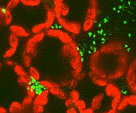Plant Pathology, Department of

Department of Plant Pathology: Faculty Publications
Document Type
Article
Date of this Version
12-19-2022
Citation
Population Genomics of the Maize Anthracnose Pathogen. January/February 2023 Volume 14 Issue 1. 10.1128/mbio.02878-22
Abstract
Understanding the genetic diversity and mechanisms underlying genetic variation in pathogen populations is crucial to the development of effective control strategies. We investigated the genetic diversity and reproductive biology of Colletotrichum graminicola isolates which infect maize by sequencing the genomes of 108 isolates collected from 14 countries using restriction site-associated DNA sequencing (RAD-seq) and wholegenome sequencing (WGS). Clustering analyses based on single-nucleotide polymorphisms revealed three genetic groups delimited by continental origin, compatible with short-dispersal of the pathogen and geographic subdivision. Intra- and intercontinental migration was observed between Europe and South America, likely associated with the movement of contaminated germplasm. Low clonality, evidence of genetic recombination, and high phenotypic diversity were detected. We show evidence that, although it is rare (possibly due to losses of sexual reproduction- and meiosis-associated genes) C. graminicola can undergo sexual recombination. Our results support the hypotheses that intra- and intercontinental pathogen migration and genetic recombination have great impacts on the C. graminicola population structure.


Comments
Open access.